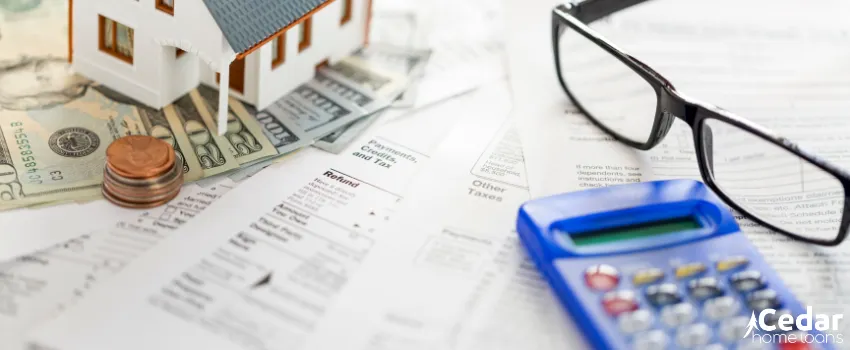Buying a home is a significant financial decision that can bring stability, security, and a sense of accomplishment. It is also a commitment with various financial responsibilities, including mortgage payments, insurance, and maintenance costs. However, along with these responsibilities, it can also offer a range of economic benefits, such as tax deductions for home ownership.
When you own a home, you may qualify for certain homeownership tax deductions that can help lower your overall tax burden. These deductions are designed to reduce the amount of your income that is subject to taxation, ultimately putting more money back in your pocket. In this blog, we’ll explore the advantages of these deductions and how they can benefit you as a homeowner.
Are tax benefits an advantage of homeownership?
Yes, tax benefits are a significant advantage of homeownership. When you own a home, you can take advantage of various tax deductions, which can help lower your overall tax liability. These deductions can significantly reduce the income you must pay taxes on, freeing up more money for other financial goals and expenses.
However, it’s worth noting that the specific homeownership tax deductions you’ll receive depend on your country’s financial situation and tax laws. In some cases, the benefits may be more substantial for specific individuals, such as those with higher incomes or larger mortgage payments. To determine the precise tax advantages of homeownership for your circumstances, it’s best to consult with a tax professional.
What are the specific tax benefits of homeownership?
There are various homeownership tax deductions, including the following:
1. Capital Gains Exclusion
The capital gains exclusion is a significant homeowner tax deduction when you sell your primary residence at a profit. Under the current tax laws, you can exclude up to $250,000 in capital gains from your income if you’re a single filer and up to $500,000 if you’re married and filing jointly.
To qualify for this tax deduction for homeownership, you must meet certain requirements, including using the home as your primary residence for at least two of the five years before the sale. If you satisfy these conditions, the profit you make from the sale can be excluded from your taxable income, potentially resulting in substantial tax savings.
2. Home Equity Loan Interest Deduction
The home equity loan interest deduction is a tax benefit for homeowners who use a home equity loan or a home equity line of credit (HELOC) for specific purposes. These loans allow homeowners to borrow against the equity they have built in their property.
To qualify for this homeownership tax deduction, the loan must have been used to improve the home or finance other qualified expenses, such as education or medical costs. If the loan meets these criteria, you can deduct the interest paid as an itemized expense, reducing your taxable income.
3. Energy-Efficient Home Improvement Tax Credits
Energy-efficient home improvement tax credits are another tax benefit available to homeowners. If you make qualifying energy-saving improvements to your home, you may be eligible for these tax credits. Unlike deductions that reduce your taxable income, credits provide a dollar-for-dollar reduction in your tax bill, offering more significant savings.
It’s worth noting that the availability of these homeownership tax deductions can vary, as they have been subject to changes in legislation in recent years. It’s best to consult the most up-to-date tax guidelines or a tax professional to determine which energy-efficient improvements qualify for credits and the associated tax savings.
Do I get tax deductions for buying a house?
Yes, you can get tax deductions for buying a house. When you purchase a home, several expenses can be considered for tax deductions. These commonly include mortgage interest, points, and property taxes. Let’s explore these deductions in detail:
1. Mortgage Interest Deduction
One of the most significant homeownership tax deductions is the mortgage interest deduction. The interest you pay on your mortgage can be substantial, particularly in the early years of homeownership, when most of your mortgage payments go toward interest rather than the principal amount.
To claim this deduction, you must itemize your deductions on your tax return. Additionally, it’s important to note that this deduction has certain limitations for larger mortgages. The current tax laws cap the eligible mortgage debt at $750,000 for married couples filing jointly and $375,000 for those filing separately.
2. Points Deduction
The points deduction is another tax break available to homebuyers. Points, also known as loan origination fees, are upfront charges paid to the lender to reduce the interest rate on the mortgage. Each point is typically equal to 1% of the total loan amount.
To qualify for this homeownership tax deduction, you must meet certain requirements, including points within the range of what is considered standard in your area and the loan used to purchase or build your primary residence. If these conditions are met, you can deduct the total points on your tax return, reducing your taxable income.
3. Property Tax Deduction
The property tax deduction allows homeowners to deduct the amount they pay in local property taxes from their federal tax liability. Property taxes are typically based on the assessed value of your home and are delivered to local government authorities. The good news for homeowners is that these taxes are considered deductible expenses.
To claim this tax deduction for homeownership, you must itemize your deductions on Schedule A and provide the total property taxes paid during the tax year. It’s important to note that property tax rates can vary depending on your location, so the potential tax savings from this deduction will differ as well.
4. Mortgage Insurance Premium Deduction
The mortgage insurance premium deduction is a tax break that benefits homeowners with mortgage insurance. Mortgage insurance is generally mandated for individuals who provide a down payment that is less than 20% of the property’s buying price. This insurance serves as a safeguard for the lender if the borrower fails to meet loan obligations. If you fall into this category, you may be able to deduct the cost of your mortgage insurance premiums on your tax return.
To qualify for this homeownership tax deduction, your mortgage insurance must have been issued after 2006, and you must have obtained the insurance for either the purchase of a home or the refinancing of an existing mortgage. If you meet these criteria, you can deduct the total amount of your mortgage insurance premiums as an itemized expense, reducing your taxable income.
Key Takeaways
Buying a home is more than just a significant financial commitment; it’s an investment with a range of economic benefits, particularly in tax deductions. Homeownership offers various avenues to reduce your taxable income, from mortgage interest and points to property taxes and even mortgage insurance premiums.
Additionally, special tax benefits like capital gains exclusion and home equity loan interest deductions can provide substantial tax deduction benefits. Tax credits are available to lower your tax bill for those looking to make energy-efficient home improvements.
Understanding these tax benefits can be complex, and the specific advantages you’ll gain depend on your financial situation and current tax laws. Therefore, consulting with a tax professional is highly recommended to maximize these benefits.
Ready to take the first step towards home ownership and unlock these incredible tax benefits?
Cedar Home Loans is here to guide you through the mortgage process and help you understand the long-term financial advantages of owning a home. Our Breckenridge home loans can provide you with the mortgage solutions that best fit your needs. Contact us today to start your journey to financial stability and long-term wealth through home ownership!




